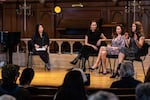
Moderator Jacqueline Keeler (left) leads a conversation with playwrights Larissa FastHorse, DeLanna Studi and Mary Kathryn Nagle during an event sponsored by Advance Gender Equity in the Arts at the Old Church in Portland.
Morrow Hammock Photography
Astronomers have a term for three celestial bodies coming into alignment: a syzygy. It's the most appropriate term we could think of for the onstage confluence in Oregon this month: three of the state's biggest professional theaters are staging works by contemporary indigenous playwrights — all of them women.
Oregon Shakespeare Festival is presenting "Manahatta" by Mary Kathryn Nagle (Cherokee Nation of Oklahoma) through Oct. 27 — a play of broad ambitions and wit, it draws parallels between colonial American history and the 2008 financial crisis.
Writer and activist Delanna Studi (Cherokee) is performing her autobiographical one-woman show, "And So We Walked," at the Portland Center Stage. A wry narrative about retracing the Trail of Tears with her father, Studi's monologue also traces her personal path to interpreting her own Cherokee identity. Performances continue through May 13.
The world-premiere production of Larissa Fasthorse's (Sicangu Lakota) “The Thanksgiving Play” is onstage through April 29 at Artists’ Repertory Theatre. It's a scathing comedy about a group of white artists trying to put together a politically correct Thanksgiving play during Native American Heritage Month, more or less failing miserably.
Here are some highlights of our conversation. Hear it in full by using the audio player above.
On why they wrote their plays
Mary Kathryn Nagle: Many of our tribal communities and tribal nations deal with loss of home. I'm always interested in seeing how we reconnect with home. And seeing what was happening in 2008 I saw this as an opportunity for non-natives to have a glimpse at what it means to be Native in the United States today, because so many of us have lost our homes.
Larissa Fasthorse: Well-meaning people … the biggest enemy is their fear of making a mistake. They want to be so correct and so right and so PC and so concerned about equality, diversity, inclusion that they will do nothing, rather than make a mistake. I can't fight that ... I can only overcome someone trying; then I can respond to that and we can find a way to work together. I tell any theater company that's willing to work with me, "You have to be willing to make mistakes. You have to be willing to fail and if you aren't we're not going to get anywhere."
Delanna Studi: There've been so many stoic pieces written about our people. I wanted to show a piece where we were actually flawed human beings that are trying every day. Sometimes we fail, sometimes we succeed but we try.
On why they chose theater
Fasthorse: Theater is an indigenous art form. We've been practicing theater in so many different forms for thousands of years. We are theater artists ... I just take what we do naturally and translate it for a Western audience. Playwriting is my social justice work. What you see onstage is not the end for me. What happens offstage and in the community is the point of all of this for me.
Studi: A play removes the screen. So all of a sudden the audience is part of that shared with the actor on the stage ... in most of my shows I make eye contact with people because I want them to know I see you. And I acknowledge what you're doing and what you're doing is affecting me and hopefully what I'm doing is affecting you back.
Nagle: As an attorney, I can write briefs until I'm blue in the face. But we have to change the narrative of native people and that's where artists come in and thats where theater comes in.